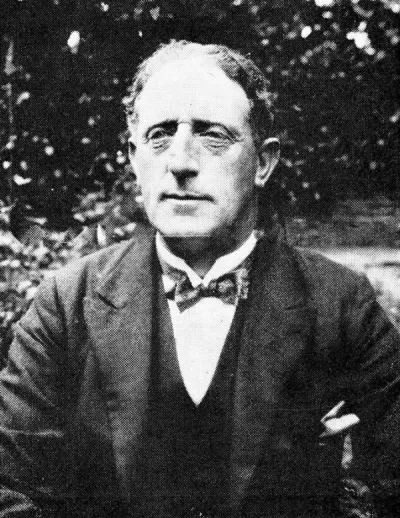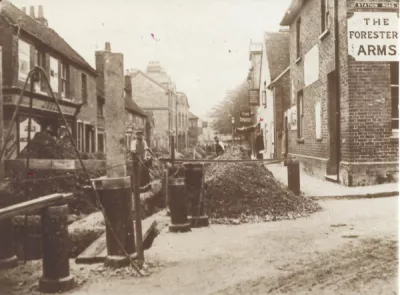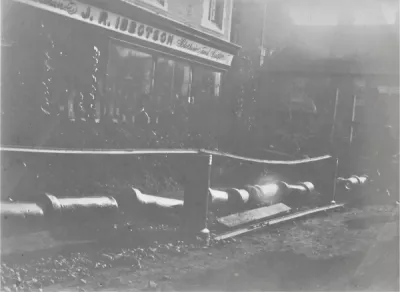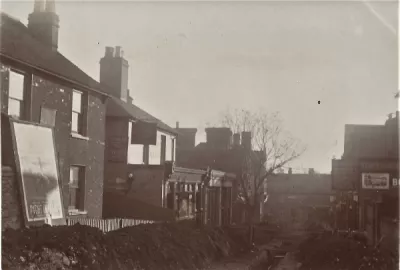Albert Freeman – surveyor and public health leader

Albert Freeman was one of the most influential people shaping our surroundings a century ago. He came, aged 25, to Rickmansworth as Surveyor to the Highways Board in 1895, and when the UDC was set up in 1898 he became both Highways Surveyor and Sanitary Inspector until he retired in 1935. He married Jessie in 1898, and they lived in Nightingale Road.
His work was extremely broad: inspecting the accommodation standards in canal boats as required by the Canal Boats Act of 1877, widening local roads including Church Street and at Money Hill, numbering houses, checking building applications for compliance with the Byelaws – this during the climax of Metro-Land development – making sure water was supplied to houses and gas to street lights, clearing ditches, and tracking cases of infectious disease such as diphtheria. He served as a Special Constable during WW1 - and he kept a daily diary, some of which has survived and which gives us a fine insight into how the district developed between 1915 and 1930.
His main focus early on was the sewage main, and the ‘farm’ at Mill End. Before 1901 there were only cesspools, and a thousand earth closets to be emptied weekly by a council contractor. The upheaval can be imagined from the photos, and part of Freeman’s work then became ensuring that both new and existing houses were connected - it took years, although night-soil collections were discontinued in late 1905. The council having bought the gas works in 1903, he became manager of it in 1906, and was heavily involved in the provision of Council houses from 1920, with Gonville Avenue among the first roads to be developed (and causing him a good many problems).



"Inspecting Berry Lane tip and Mill End Infants school where WC’s flushing unsatis, reported to Lomas, Clerk to [Managers?]. Inspected Boys School R[ickmansworth], WC ok. B[atchworth]Hill Gas main, measured extra length to reach M[oor] P[ark] Farm. Zeppelin reported above about 9 30, guns firing, did not see. Reported dropping bombs in Hertford. 7 killed."
Then, next day, "On duty as Special Constable 12 20 to 2 30 am to stop cars in St[atio]n Rd. None came! Inspected Girls’ School WCs. OK. Drafted reports for Council meeting this evening. The Johnson’s Corner scheme passed 6 - 4."
And on 21st, "At Dickinsons Institute for conversion into Convalescent Home for wounded [this became the Red Cross VAD hospital]. Fosters next door about prompt removal of manure from yard adjoining ...! Tyler and Taylor slotting. He personally fixed a gas burner at 47 Ch St."
Albert Freeman was also an ardent supporter of public open spaces. Twenty acres of Rickmansworth Park, Scotsbridge playing fields, Ebury and Croxley Recreation Grounds, Croxley Woods and the Bury meadows were among the spaces secured and laid out, along with the golf course at Batchworth. All these were, and still are, for the benefit of the public, and have resisted much pressure for their continued existence. He was also responsible for laying out the new allotment sites around the area, following Government policy for improving conditions for returning servicemen, and did so with vigour.
His personal interests were just as broad. He was on the committees of the Choral Society and the library (of which he was a founder member), played hockey and bowls, was a Vice President of the Horticultural Society, a founder member of the swimming club and secretary of the local Missions to Seamen. Even in retirement he acted as a Town Planning advisor, and was a County Councillor from 1940 to 1946.
Albert Freeman died in 1950 at the age of 80. He has left an enduring legacy which includes our public open spaces and a working sewage system, as well as the basis of the planning system which shaped the area between the Wars. His was truly a lifetime’s achievement.